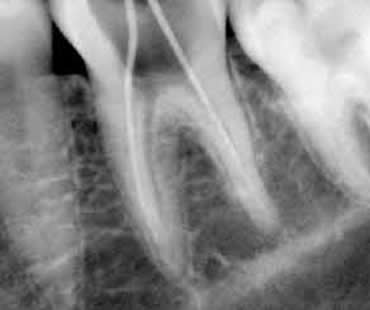
by Dr. Adkins | Oct 7, 2017 | Blog, Dental Topics, Uncategorized
While no one looks forward to root canal treatment, the procedure can be critical for saving a compromised tooth. To ensure proper healing, your dentist will provide you with aftercare instructions. Along with those recommendations, there are several tips you can follow after your root canal treatment to speed up your recovery, promote healing, and avoid potential complications.
- Avoid chewing on the treated side of your mouth until all of the numbness from the anesthetic has completely worn off. Stay away from crunchy, hard, or chewy foods for several days.
- To keep swelling at a minimum, apply an ice pack or bag of frozen peas on the treated area for thirty minutes. Repeat this process hourly for about fifteen minutes each time until swelling subsides.
- Keep your head elevated while sleeping for several days after treatment.
- Gently rinse your mouth with warm salt water regularly for the first few days after root canal treatment.
- Do not smoke for a minimum of 24 hours post-procedure, and refrain from tobacco usage as much as possible until the treated area is fully healed.
- Refrain from strenuous physical activity or exercise for 48 hours after your root canal procedure.
- Relieve pain with anti-inflammatory medication, either over-the-counter ibuprofen or prescription as determined by your dentist
These tips, along with the aftercare instructions provided by your dental professional, should help ensure the best chance of a successful and quick recovery. However, should you experience excessive swelling, pain, the appearance of a rash or hives, or a return of original symptoms, you should contact your dentist or oral surgeon immediately.
If you need a dentist in McDonough, contact us today

by Dr. Adkins | Aug 28, 2017 | Blog, Dental Topics, Uncategorized
There’s a whole branch of dentistry made for giving you the smile you’ve always wanted. Cosmetic dentistry provides numerous options for treatment with the goal of improving the appearance of your smile. Often there are oral health benefits as well, but the primary purpose is making cosmetic improvements to your smile.
Cosmetic dentists complete training in specialized procedures that some dental practices may not offer. If you’re looking for ways to enhance your look, seek help from a reputable and qualified cosmetic dentist to assist you in achieving your goals. It’s a matter of communicating what you dislike about your smile, undergoing an examination so that the dentist can make recommendations, and then deciding your treatment plan together. Some patients choose only a single procedure, and others pursue several in order to get their final beautiful smile.
What are some common cosmetic dental procedures?
- Veneers – thin layers of porcelain are bonded to the fronts of teeth to hide many kinds of flaws, like chips, cracks, discolorations, gaps and more. Veneers provide a durable way to instantly improve smiles.
- Implants – a titanium rod is surgically placed into the jaw bone to create a new root for a missing tooth. After healing, an artificial tooth is secured on top to finalize the restoration. Implants provide a secure, natural looking, and permanent alternative to dentures.
- Teeth whitening – stains and discolorations are removed in only an hour’s time through professional whitening methods. Dramatic improvements can be made to smiles without the hassles and waiting of at-home whitening methods.
- Crowns and bridges – teeth that have decayed or weakened from root canal treatment may ultimately fall out. Strengthening of a tooth can be achieved through a crown, which covers the entire tooth to protect it from cracks and possible cavities. A bridge replaces more than one missing tooth to fully restore a smile.
- Invisalign – crooked teeth can be improved using Invisalign clear plastic aligners. This series of removable trays gently moves teeth into better alignment without the embarrassing process of traditional braces.
No matter what is making you unhappy with the appearance of your smile, it’s worth your time to schedule an appointment with a cosmetic dentist. Chances are that you’ll be on your way to a brand new smile!
Schedule your appointment at our McDonough dental office

by Dr. Adkins | Aug 7, 2017 | Blog, Dental Topics, Uncategorized
Even though regular checkups and proper dental hygiene greatly decrease the need for root canal treatment, the fact remains that it is one of the most common procedures performed by dentists today.
What are some of the most common reasons you might need this dental solution?
Decay
The primary cause for root canal procedures is decay that has entered the tooth pulp chamber and progressed to the point of causing infection or abscesses. Pain and tooth sensitivity often accompanies severe decay. Root canal treatment is the best way to avoid tooth extraction and restore oral health.
Trauma
If a tooth endures strong force such as from a sports injury, car accident or fall, the trauma can damage the tooth so badly that root canal treatment is needed. Even if trauma isn’t completely evident at first, a severed nerve to the tooth can cause it to die over time.
Genetics
Traits of teeth like their strength are passed along through genes. Some people inherit soft teeth that are more prone to decay, making it difficult to avoid decay even with diligent oral hygiene.
>h3>Tooth fracture>/h3>
A tooth can be fractured through chewing hard foods or ice, teeth grinding or clenching, or habits like nail biting. Even hairline fractures may allow bacteria to enter the tooth’s pulp and cause infections. Once the bacteria takes hold, root canal treatment may become necessary.
Deep cavity
Deep cavities within teeth can allow infections to thrive, eventually causing the tooth to become inflamed or die. A deep cavity isn’t necessarily painful, so patients may not even realize they have an infection. Regular dental checkups help catch cavities early, before they are able to become so deep and serious.
Previous dental work
Extensive or repeated dental work can cause trauma to teeth nerves and associated inflammation, making root canal therapy an important solution.
Pain
A toothache or sensitivity are the most obvious causes for root canal treatment. The pain can become severe and cause related headaches and earaches, abscesses, swelling or other problems. An emergency root canal procedure might be necessary to save the tooth and end the pain.
If you live in the McDonough area, contact us today

by Dr. Adkins | Jul 21, 2017 | Blog, Dental Topics, Uncategorized
Sometimes you experience symptoms in your mouth that cause you to wonder what’s going on and if you need to see a dentist. If you are thinking you might need root canal treatment, it’s time to see the dentist for an examination. Here are some common signs that you may need this treatment. Keep in mind, however, that you may or may not experience all of these symptoms.
Pain
One indicator that something is wrong is when a tooth causes pain. Sometimes pain may be severe, causing you to rush to the dentist. If the pain is sharp or intense, or even if it is a dull ache that lasts for several days, make a dental appointment as soon as possible. Remember that some teeth requiring root canal treatment don’t hurt at all, so regular checkups are important.
Swelling
An obvious sign of infection is swelling. If you notice your jaw or face is swollen, see your dentist. It doesn’t always mean root canal therapy is needed, but the dentist can advise you about the best way to treat the swelling and any infection.
Sensitivity
If you experience sensitivity when you consume anything that is hot or cold, it can be a sign that root canal treatment is necessary. Mild sensitivity can even be a sign, especially if the sensation occurs near a certain tooth each time.
Darkened tooth
Discoloration of a tooth can mean something unwanted is occurring within the tooth’s nerve space. Gray, dark yellow, or black are colors to look for and to consult your dentist if they appear. A tooth may also darken as a result of trauma or decay, so a professional examination is recommended to determine what’s causing the color change.
Gum boil
A gum boil is a lesion resembling a pimple that may appear on your gum tissue. It is often related to an infection inside the soft tissues of your mouth, and a boil results when pus accumulates. The lesion usually is tender and swelling can occur. See your dentist if you develop a gum boil, even if it comes and goes.
Schedule your appointment at our McDonough dental office






 770-957-5214
770-957-5214  E-Mail Us
E-Mail Us 
